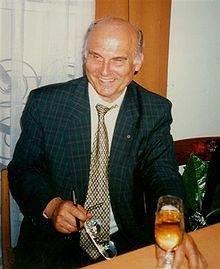Ryszard Kapuściński
Polish journalist, photographer, poet and author (1932–2007)
Ryszard Kapuściński (March 4, 1932 – January 23, 2007) was a Polish journalist, photographer, poet and author.

| This article on an author is a stub. You can help out with Wikiquote by expanding it! |
Quotes
edit- The experience was an exciting one for me. It illustrated that writing was about risk—about risking everything. And that the value of the writing is not in what you publish but in its consequences. If you set out to describe reality, then the influence of the writing is upon reality.
- A 1989 interview with Granta magazine founder Bill Buford. Reprinted in Adbusters Magazine #71.
- Even though you can destroy a man, destroying him does not make him cease to exist. On the contrary, if I can put it this way, he begins to exist all the more. These are paradoxes no tyrant can deal with. The scythe swings, and at once the grass starts to grow back. Cut again and the grass grows faster than ever. A very comforting law of nature.
- Attributed to an anonymous Iranian in Shah of Shahs, Vintage International edition, p. 3
- It is authority that provokes revolution....This occurs when a feeling of impunity takes root among the elite: We are allowed anything, we can do anything. This is a delusion, but it rests on a certain rational foundation. For a while it does indeed look as if they can do whatever they want. Scandal after scandal and illegality after illegality go unpunished. The people remain silent...They are afraid and do not yet feel their own strength. At the same time, they keep a detailed account of the wrongs, which at one particular moment are to be added up. The choice of that moment is the greatest riddle of history.
- Shah of Shahs, Vintage International edition, p. 106
- Life is truly known only to those who suffer, lose, endure adversity and stumble from defeat to defeat.
- A Warsaw Diary, in Granta [magazine], no. 15 (Cambridge, England, 1985)
Quotes about Ryszard Kapuściński
edit- (Has a book ever brought you closer to another person, or come between you?) A friend once called “The Shadow of the Sun,” by Ryszard Kapuscinski, an “authentic” reportage voice on Africa. I disagreed. I think it is a fictional portrait masquerading as nonfiction, about an Africa that he wanted to see rather than one he actually saw. It misrepresents many practices and beliefs in different countries, and its many generalizations about “the African” are fatuous. To this, the friend said that it didn’t matter if he got the facts wrong because the book was really an allegory of communism. It was eye-opening for me, and made me see this friend differently, because of the paternalism in that opinion. If I were to write a nonfiction book riddled with inaccuracies about Europe and then insisted that it really was an allegory on military dictatorship in Nigeria, few would find that acceptable and fewer still would praise it as the authentic voice on Europe.